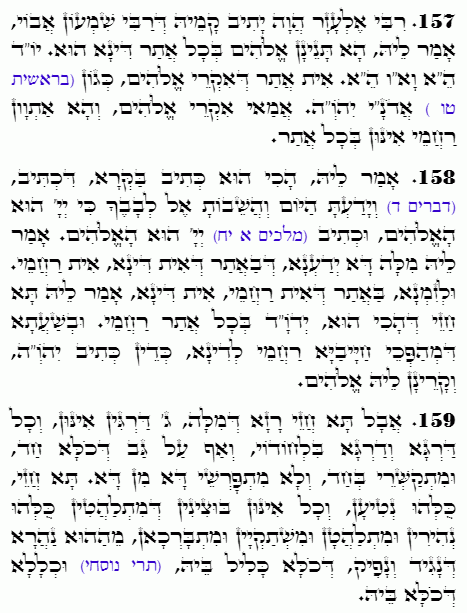Daily Zohar # 4623 – Acharei Mot – YHVH is Elokim
Daily Zohar 4623

Hebrew translation:
158. אָמַר לוֹ, כָּךְ זֶה כָּתוּב בַּמִּקְרָא, שֶׁכָּתוּב (דברים ד) וְיָדַעְתָּ הַיּוֹם וַהֲשֵׁבוֹתָ אֶל לְבָבֶךָ כִּי ה’ הוּא הָאֱלֹהִים, וְכָתוּב (מלכים-א יח) ה’ הוּא הָאֱלֹהִים. אָמַר לוֹ, דָּבָר זֶה יָדַעְתִּי, שֶׁבְּמָקוֹם שֶׁיֵּשׁ דִּין יֵשׁ רַחֲמִים, וְלִפְעָמִים בְּמָקוֹם שֶׁיֵּשׁ רַחֲמִים יֵשׁ דִּין. אָמַר לוֹ, בֹּא וּרְאֵה שֶׁכָּכָה זֶה, יְהֹוָ”ה בְּכָל מָקוֹם רַחֲמִים. וּבְשָׁעָה שֶׁמְּהַפְּכִים הָרְשָׁעִים רַחֲמִים לְדִין, אָז כָּתוּב יִהֹוְ”ה, וְקוֹרְאִים אוֹתוֹ אֱלֹהִים.
159. אֲבָל בֹּא רְאֵה סוֹד הַדָּבָר, שָׁלֹשׁ דְּרָגוֹת הֵן, וְכָל דַּרְגָּה וְדַרְגָּה לְבַדָּהּ, וְאַף עַל גַּב שֶׁהַכֹּל אֶחָד וּמְקֻשָּׁרִים בְּאֶחָד, וְלֹא נִפְרָדִים זֶה מִזֶּה. בֹּא רְאֵה, כָּל הַנְּטִיעוֹת וְכָל הַמְּאוֹרוֹת (שֶׁמִּתְלַהֲטִים) כֻּלָּם מְאִירִים וּמִתְלַהֲטִים וְנִשְׁקִים וּמִתְבָּרְכִים מֵאוֹתוֹ נָהָר שֶׁשּׁוֹפֵעַ וְיוֹצֵא שֶׁהַכֹּל כָּלוּל בּוֹ, וּבוֹ כְּלַל הַכֹּל.
.
Zohar Acharei Mot
Continued from previous DZ
#157
Rabbi Elazar was sitting before Rabbi Shimon, his father. He said to him, “We have learned that the name ‘אֱלֹהִים’ ‘Elokim’ in every place signifies judgment. The name ‘YHVH’ is sometimes called ‘Elokim,’ as in אֲדֹנָ “י יְהֹוְ” ה, which is ‘Adonai’ and YHVH is vocalized ‘Elokim,’ even though the letters are ‘YHVH,’ which signify mercy everywhere. Why, then, is it called ‘Elokim,’ if the letters are those of YHVH,’ which signify mercy in every place?”
Notes:
Rabbi Elazar wants to understand the apparent contradiction between the names ‘Elokim’ and ‘YHVH.’ There are instances where ‘YHVH’ is vocalized with the vowels of ‘Elokim,’ indicating judgment rather than mercy.
#158
Deuteronomy 4:39
“וְיָדַעְתָּ הַיּוֹם וַהֲשֵׁבֹתָ אֶל לְבָבֶךָ כִּי יְהוָה הוּא הָאֱלֹהִים בַּשָּׁמַיִם מִמַּעַל וְעַל הָאָרֶץ מִתָּחַת אֵין עוֹד.”
“Therefore know this day, and consider it in your heart, that YHVH Himself is God (הָאֱלֹהִים, Elokim) in heaven above and on the earth beneath; there is no other.”
Rabbi Elazar said to Rabbi Shimon, “is written, ‘YHVH is Elokim.’ He said, ‘I knew that where there is judgment, there is mercy, and sometimes where there is mercy, there is judgment. And thus it is written, ‘YHVH is Elokim.’ He said to him, ‘Come and see that it is so, for YHVH everywhere signifies mercy, and when the wicked turn mercy into judgment, then it is written YHVH, and it is read as Elokim.'”
Notes:
Rabbi Shimon clarifies the concept that the name ‘YHVH,’ typically associated with mercy, can sometimes be vocalized as ‘Elokim,’ indicating judgment. This interchangeability signifies that Hashem’s mercy and judgment are not entirely separate but interconnected.
The verse that states, “YHVH is Elokim,” illustrates that these two attributes can coexist within the divine. Rabbi Shimon explains that the wicked can transform divine mercy into judgment through their actions, causing the name ‘YHVH’ to be read as ‘Elokim.’ This transformation reflects a shift in the divine interaction from mercy to judgment.
The discussion emphasizes the fluidity and complexity of divine attributes, showing that mercy can contain elements of judgment and vice versa. It also underscores the impact of human behavior on the manifestation of these divine attributes in the world.
#159
Come and see the secret of the matter. There are three levels, and each level is distinct in itself, even though they are all one and are interconnected as one, not separated from each other. Come and see, all the Sefirot, and all the Sefirot of Malchut, which are called ‘מאורי אש’ the fiery lights, all shine, flamed, are nourished, and blessed by that river that flows, which is Binah. Everything is included in it, for all the Mochin come from it, and it encompasses everything.
Notes:
The spiritual system operates as a seamless unity, where each part, while distinct, is vital to the whole. The sustenance and blessings flowing from Binah illustrate the idea that higher spiritual understanding and wisdom are the sources from which all other levels draw their energy and purpose.
{||}

 Previous: Acharei Mot
Previous: Acharei Mot

